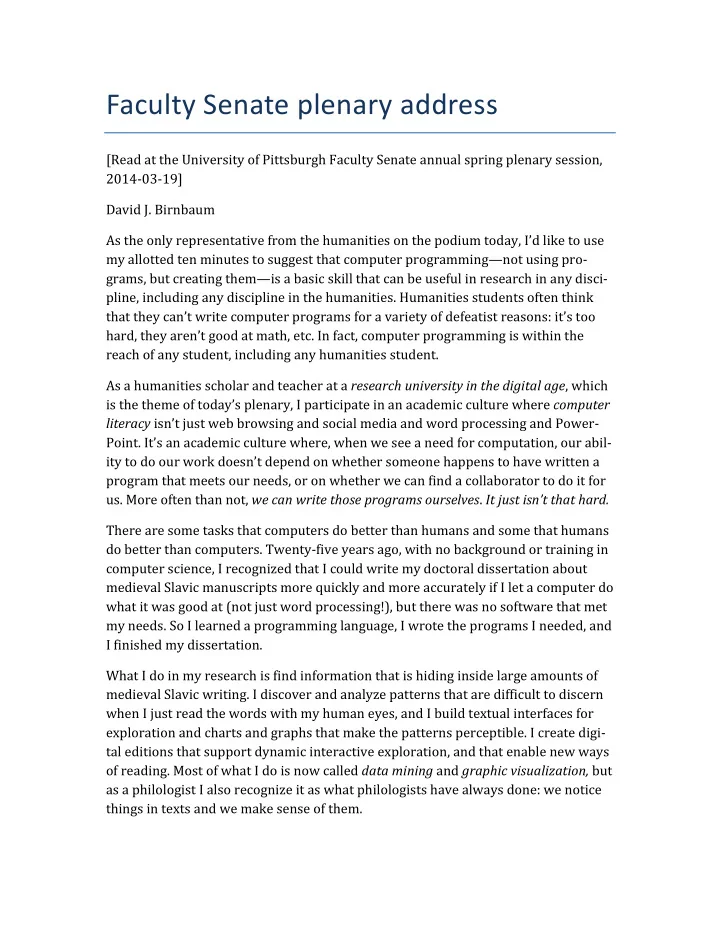

Faculty ¡ Senate ¡pl e n a ry ¡ address ¡ [Read ¡at ¡the ¡University ¡of ¡Pittsburgh ¡Faculty ¡Senate ¡annual ¡spring ¡plenary ¡session, ¡ 2014-‑03-‑19] ¡ David ¡J. ¡Birnbaum ¡ As ¡the ¡only ¡representative ¡from ¡the ¡humanities ¡on ¡the ¡podium ¡today, ¡I’d ¡like ¡to ¡use ¡ my ¡allotted ¡ten ¡minutes ¡to ¡suggest ¡that ¡computer ¡programming—not ¡using ¡pro-‑ grams, ¡but ¡creating ¡them—is ¡a ¡basic ¡skill ¡that ¡can ¡be ¡useful ¡in ¡research ¡in ¡any ¡disci-‑ pline, ¡including ¡any ¡discipline ¡in ¡the ¡humanities. ¡Humanities ¡students ¡often ¡think ¡ that ¡they ¡can’t ¡write ¡computer ¡programs ¡for ¡a ¡variety ¡of ¡defeatist ¡reasons: ¡it’s ¡too ¡ hard, ¡they ¡aren’t ¡good ¡at ¡math, ¡etc. ¡In ¡fact, ¡computer ¡programming ¡is ¡within ¡the ¡ reach ¡of ¡any ¡student, ¡including ¡any ¡humanities ¡student. ¡ ¡ As ¡a ¡humanities ¡scholar ¡and ¡teacher ¡at ¡a ¡ research ¡university ¡in ¡the ¡digital ¡age , ¡which ¡ is ¡the ¡theme ¡of ¡today’s ¡plenary, ¡I ¡participate ¡in ¡an ¡academic ¡culture ¡where ¡ computer ¡ literacy ¡isn’t ¡just ¡web ¡browsing ¡and ¡social ¡media ¡and ¡word ¡processing ¡and ¡Power-‑ Point. ¡It’s ¡an ¡academic ¡culture ¡where, ¡when ¡we ¡see ¡a ¡need ¡for ¡computation, ¡our ¡abil-‑ ity ¡to ¡do ¡our ¡work ¡doesn’t ¡depend ¡on ¡whether ¡someone ¡happens ¡to ¡have ¡written ¡a ¡ program ¡that ¡meets ¡our ¡needs, ¡or ¡on ¡whether ¡we ¡can ¡find ¡a ¡collaborator ¡to ¡do ¡it ¡for ¡ us. ¡More ¡often ¡than ¡not, ¡ we ¡can ¡write ¡those ¡programs ¡ourselves . ¡ It ¡just ¡isn’t ¡that ¡hard. ¡ ¡ There ¡are ¡some ¡tasks ¡that ¡computers ¡do ¡better ¡than ¡humans ¡and ¡some ¡that ¡humans ¡ do ¡better ¡than ¡computers. ¡Twenty-‑five ¡years ¡ago, ¡with ¡no ¡background ¡or ¡training ¡in ¡ computer ¡science, ¡I ¡recognized ¡that ¡I ¡could ¡write ¡my ¡doctoral ¡dissertation ¡about ¡ medieval ¡Slavic ¡manuscripts ¡more ¡quickly ¡and ¡more ¡accurately ¡if ¡I ¡let ¡a ¡computer ¡do ¡ what ¡it ¡was ¡good ¡at ¡(not ¡just ¡word ¡processing!), ¡but ¡there ¡was ¡no ¡software ¡that ¡met ¡ my ¡needs. ¡So ¡I ¡learned ¡a ¡programming ¡language, ¡I ¡wrote ¡the ¡programs ¡I ¡needed, ¡and ¡ I ¡finished ¡my ¡dissertation. ¡ ¡ What ¡I ¡do ¡in ¡my ¡research ¡is ¡find ¡information ¡that ¡is ¡hiding ¡inside ¡large ¡amounts ¡of ¡ medieval ¡Slavic ¡writing. ¡I ¡discover ¡and ¡analyze ¡patterns ¡that ¡are ¡difficult ¡to ¡discern ¡ when ¡I ¡just ¡read ¡the ¡words ¡with ¡my ¡human ¡eyes, ¡and ¡I ¡build ¡textual ¡interfaces ¡for ¡ exploration ¡and ¡charts ¡and ¡graphs ¡that ¡make ¡the ¡patterns ¡perceptible. ¡I ¡create ¡digi-‑ tal ¡editions ¡that ¡support ¡dynamic ¡interactive ¡exploration, ¡and ¡that ¡enable ¡new ¡ways ¡ of ¡reading. ¡Most ¡of ¡what ¡I ¡do ¡is ¡now ¡called ¡ data ¡mining ¡and ¡ graphic ¡visualization, ¡but ¡ as ¡a ¡philologist ¡I ¡also ¡recognize ¡it ¡as ¡what ¡philologists ¡have ¡always ¡done: ¡we ¡notice ¡ things ¡in ¡texts ¡and ¡we ¡make ¡sense ¡of ¡them. ¡
Digital ¡humanities ¡means ¡many ¡things, ¡and ¡the ¡type ¡of ¡digital ¡humanities ¡that ¡I ¡prac-‑ tice ¡and ¡that ¡I ¡teach ¡at ¡the ¡University ¡of ¡Pittsburgh ¡is ¡sometimes ¡called ¡ humanities ¡ computing . ¡It ¡involves ¡ writing ¡original ¡programs ¡to ¡conduct ¡primary ¡humanities ¡re-‑ search ¡that ¡would ¡otherwise ¡be ¡impossible . ¡It ¡is ¡not ¡a ¡type ¡of ¡computing; ¡it’s ¡a ¡way ¡of ¡ doing ¡certain ¡types ¡of ¡humanities ¡research, ¡no ¡different ¡from ¡other ¡humanities ¡ methods ¡and ¡methodologies. ¡What ¡I ¡do ¡when ¡I ¡write ¡programs ¡isn’t ¡computer ¡sci-‑ ence: ¡it’s ¡humanities. ¡It ¡isn’t ¡about ¡the ¡computation; ¡it’s ¡about ¡the ¡text. ¡I ¡write ¡com-‑ puter ¡programs ¡that ¡let ¡me ¡be ¡a ¡more ¡effective ¡humanities ¡researcher, ¡and ¡so ¡do ¡my ¡ students. ¡ In ¡my ¡undergraduate ¡“Computational ¡methods ¡in ¡the ¡humanities” ¡course, ¡cross-‑ listed ¡in ¡eight ¡departments, ¡undergraduate ¡humanities ¡students ¡who ¡have ¡never ¡ even ¡seen ¡a ¡line ¡of ¡computer ¡code ¡before ¡write, ¡design, ¡and ¡implement ¡original ¡pro-‑ jects ¡to ¡pursue ¡their ¡own ¡humanities ¡research ¡agendas. ¡In ¡one ¡semester ¡they ¡learn ¡ to ¡do ¡what ¡I ¡do: ¡they ¡conduct ¡the ¡research ¡that ¡matters ¡to ¡them ¡as ¡humanists, ¡letting ¡ the ¡computer ¡do ¡what ¡it’s ¡good ¡at, ¡and ¡writing ¡the ¡programs ¡they ¡need ¡to ¡get ¡their ¡ work ¡done. ¡ The ¡idea ¡for ¡my ¡course ¡was ¡born ¡when ¡I ¡overheard ¡some ¡of ¡my ¡Russian-‑language ¡ students ¡some ¡twenty ¡years ¡ago ¡lamenting ¡that ¡they ¡were ¡taking ¡a ¡programming ¡ course ¡that ¡required ¡them ¡to ¡calculate ¡a ¡Fibonacci ¡series. ¡They ¡weren’t ¡having ¡trou-‑ ble ¡writing ¡a ¡program ¡that ¡could ¡do ¡that. ¡The ¡problem ¡was ¡they ¡had ¡no ¡idea ¡why ¡ they ¡might ¡ever ¡want ¡to ¡calculate ¡a ¡Fibonacci ¡series. ¡Why ¡couldn’t ¡they ¡instead ¡have ¡ learned ¡to ¡write ¡programs ¡that ¡would ¡be ¡truly ¡useful ¡to ¡them ¡as ¡humanists, ¡that ¡ they ¡could ¡use ¡to ¡do ¡more ¡effective ¡research ¡in ¡their ¡home ¡departments? ¡Why ¡ shouldn’t ¡the ¡starting ¡point ¡for ¡what ¡they ¡were ¡learning ¡have ¡been ¡real ¡humanities ¡ research ¡questions, ¡questions ¡that ¡would ¡have ¡been ¡meaningful ¡in ¡their ¡home ¡de-‑ partments, ¡so ¡that ¡programming ¡for ¡them ¡would ¡have ¡been ¡a ¡way ¡to ¡conduct ¡hu-‑ manities ¡research, ¡and ¡not ¡itself ¡the ¡primary ¡object ¡of ¡study? ¡ I’d ¡like ¡to ¡suggest ¡three ¡ways ¡we ¡might ¡think ¡about ¡the ¡role ¡of ¡computer ¡program-‑ ming ¡in ¡the ¡academic ¡and ¡social ¡education ¡of ¡humanities ¡students: ¡ 1. Computer ¡programming ¡isn’t ¡computer ¡science. ¡Computer ¡programming ¡is ¡ more ¡like ¡writing. ¡Everyone ¡can ¡learn ¡to ¡do ¡it, ¡and ¡can ¡be ¡given ¡the ¡oppor-‑ tunity ¡to ¡learn ¡to ¡do ¡it ¡in ¡ways ¡that ¡are ¡appropriate ¡for ¡their ¡disciplines, ¡just ¡ as ¡we ¡now ¡require ¡that ¡all ¡departments ¡teach ¡writing ¡in ¡ways ¡that ¡are ¡appro-‑ priate ¡to ¡the ¡discipline. ¡You ¡don’t ¡have ¡to ¡be ¡an ¡English ¡composition ¡profes-‑ sor ¡to ¡know ¡how ¡to ¡write, ¡and ¡how ¡to ¡teach ¡writing, ¡in ¡your ¡discipline. ¡ Com-‑ puter ¡programming ¡is ¡like ¡writing. ¡
Recommend
More recommend